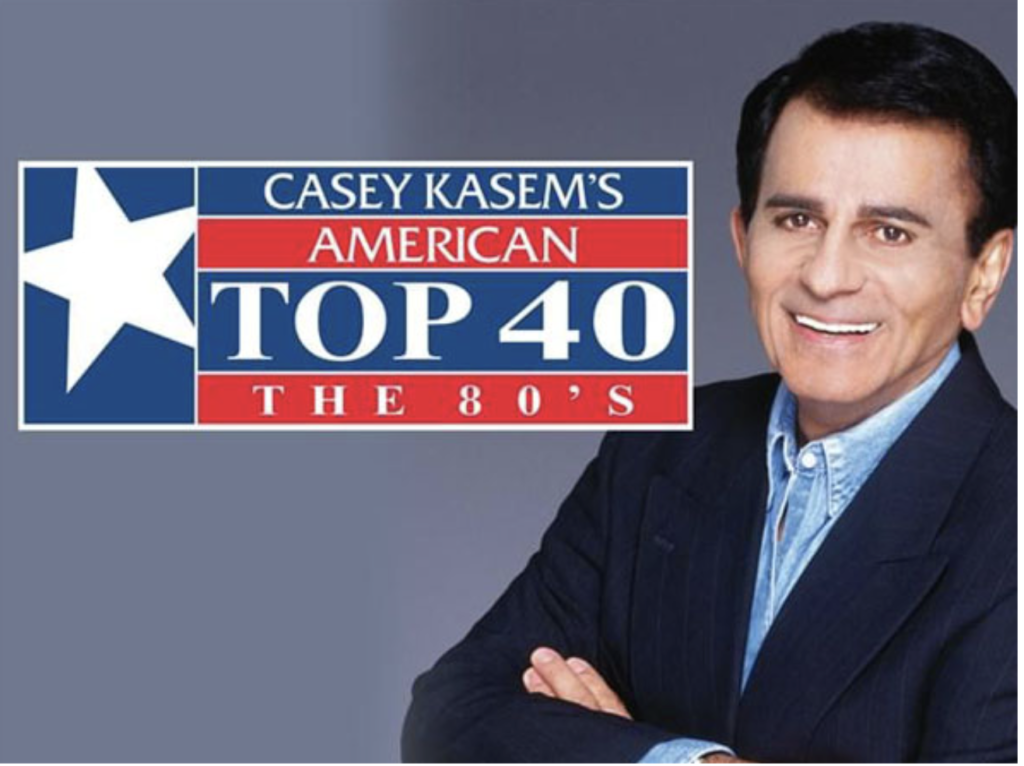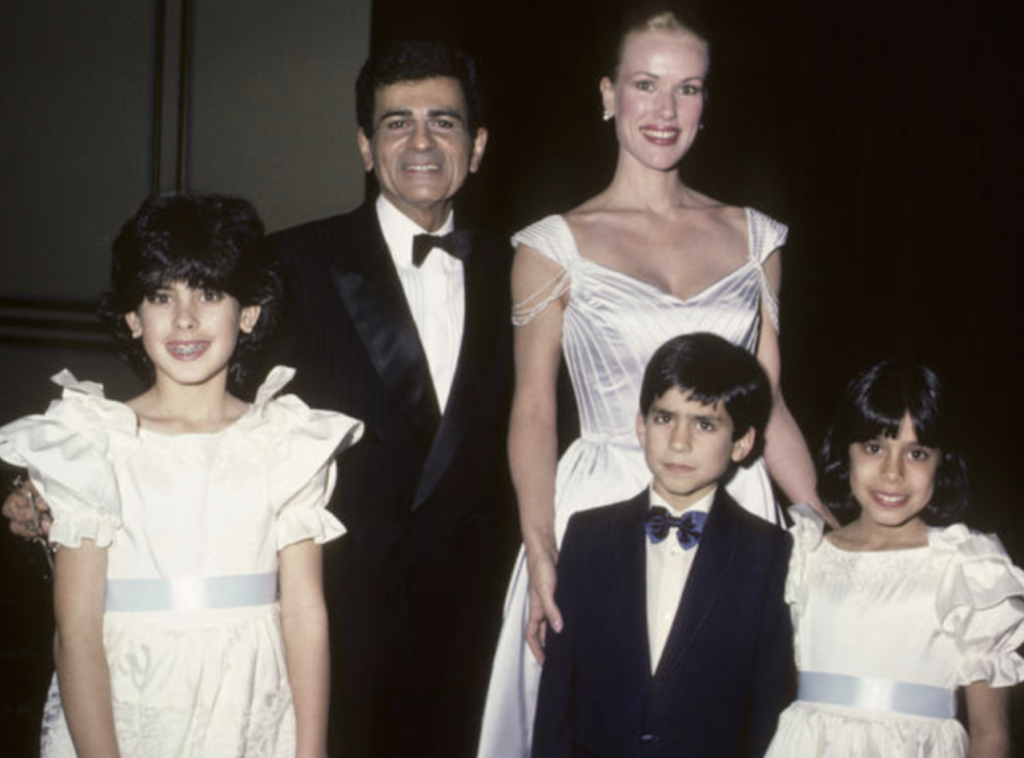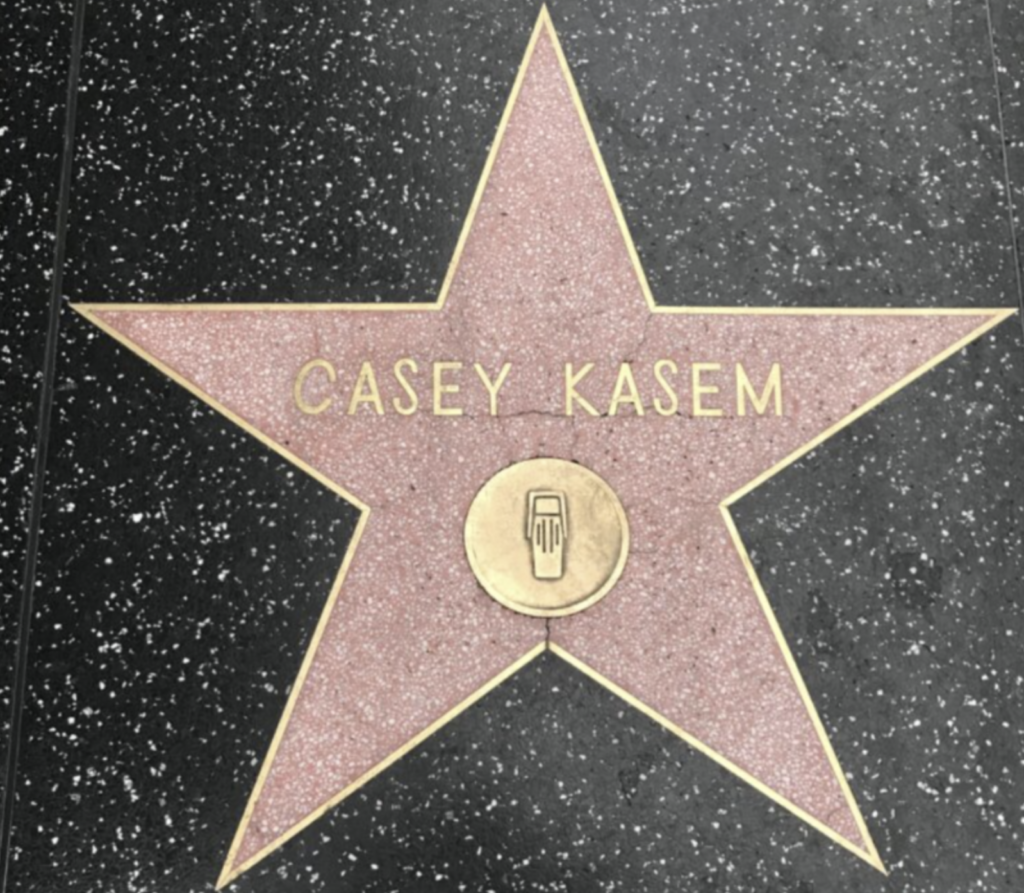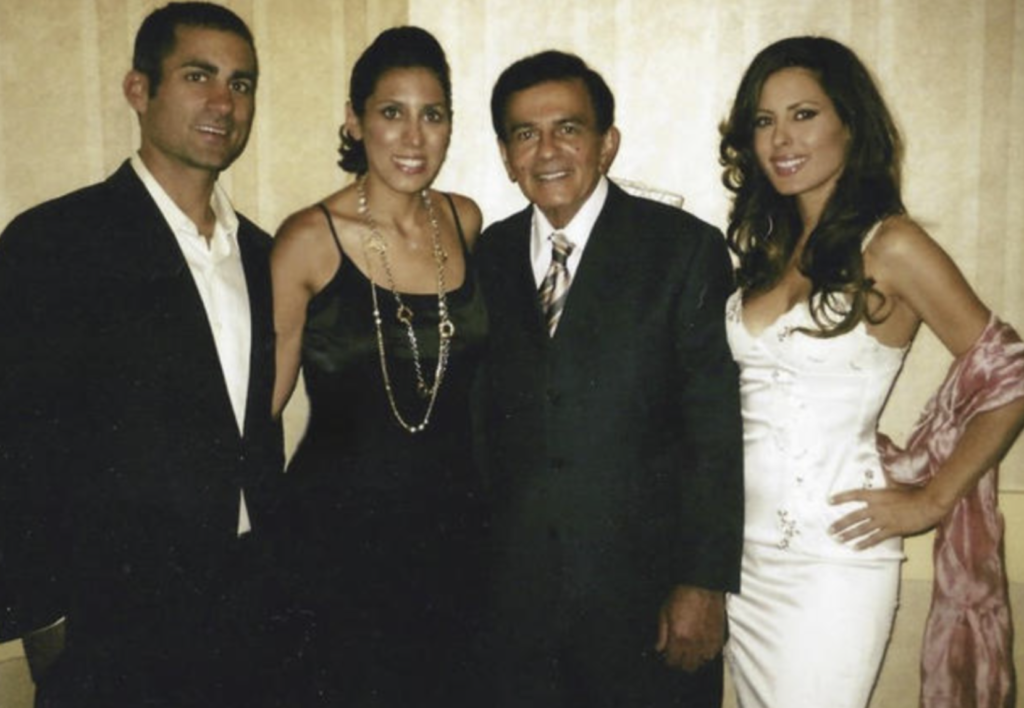Pathbreakers of Arab America—Casey Kasem

By: John Mason / Arab America Contributing Writer
This is the forty-fifth of Arab America’s series on American pathbreakers of Arab descent. The series includes personalities from entertainment, business, sports, science, academia, journalism, and politics, among other areas. Our forty-fifth pathbreaker, Casey Kasem, born in 1932 in Detroit to Lebanese Druze parents, was an American disc jockey, actor, and radio presenter. He created and hosted almost four decades of ‘American Top 40’ popular song countdown programs and provided character voices for 2,000 cartoon episodes and 10,000 commercials. His rich, velvet voice was immediately recognizable to those who grew up listening to Casey.
Living up to his signature sign-off, “Keep your feet on the ground and keep reaching for the stars,” Casey Kasem made a larger-than-life mark on American 20th-century radio programming
Kemal Amin “Casey” Kasem (كمال أمين قاسم) was born in Detroit on April 27, 1932, to Lebanese Druze immigrants, Helen and Amin Kasem. He was supposedly named after Mustafa Kemal Atatürk, the founding father of the Turkish Republic following World War I, a man Kasem said his father respected. Kasem’s parents had initially immigrated to Lebanon from the British-mandated Palestinian territory, which gives Casey ties to both Lebanon and Palestine. According to a Wikipedia entry, Kasem’s parents did not allow their children to speak Arabic and insisted they assimilate into American life, similar to the pattern of other Arab immigrant parents. Casey’s parents were grocers.
Kasem attended Northwestern High School in Detroit, where he first started his work in radio as a member of the radio club. His first assignment was to cover sports. He next attended Wayne State University, majoring in speech and English, leading to roles in national shows like ‘The Lone Ranger’ and ‘Sergeant Preston of the Yukon.’ In 1952, as reported in ‘All Palestine’ magazine, Kasem was drafted into the U.S. Army and sent to Korea. There, he worked as a DJ/announcer on the Armed Forces Radio affiliate on the peninsula, the American Forces Korea Network (AFKN). During that stint, he coordinated and acted in radio drama.
Following his military service, in 1954, Casey became a disc jockey, which took him from Detroit to Cleveland, Buffalo, San Francisco, and eventually Los Angeles. He created and hosted several radio countdown programs, notably ‘American Top 40.’ He was the first actor to voice Shaggy Rogers in the ‘Scooby-Doo’ franchise. Kasem also rendered many commercial voiceovers and performed many voices for children’s television, such as ‘Sesame Street’ and the ‘Transformers’ cartoon series.
Casey left ‘Transformers’ during the third season because he believed the show contained offensive caricatures of Arabs and Arab countries. In a 1990 article, he explained: “A few years ago, I was doing one of the voices in the TV cartoon series, Transformers. One week, the script featured an evil character named Abdul, King of Carbombya. He was like all the other cartoon Arabs. I asked the director, ‘Are there any good Arabs in this script for balance?’ We looked. There was one other — but he was no different than Abdul. So, I told the show’s director that, in good conscience, I couldn’t be a part of that show.”

Matching his words to his deeds, Kasem was active in politics, supporting Lebanese American and Arab American causes. The 1982 Israeli invasion of Lebanon triggered his passion. Casey even wrote a tract, “Arab-Americans: Making a Difference,” published by the Arab American Institute. He called for “a fairer depiction of heroes and villains on behalf of all cultures in Disney’s 1994 sequel to ‘Aladdin’ called ‘The Return of Jafar.’ In 1996, he was honored as “Man of the Year” by the American Druze Society. Furthermore, Kasem campaigned against the Gulf War, advocating non-military means of pressuring Saddam Hussein into withdrawing from Kuwait. He advocated for Palestinian independence and organized conflict-resolution workshops for Arab Americans and Jewish Americans.
Kasem was married to Linda Myers from 1972 to 1979. They had three children, Mike, Julie, and Kerri Kasem. He was married to actress Jean Thompson from 1980 until he died in 2014. They had one child, Liberty Jean Kasem. In October 2013, Kerri Kasem announced her father had Parkinson’s disease, originally diagnosed in 2007. His condition left him unable to speak during his final months. On June 15, 2014, Kasem died at St. Anthony’s Hospital in Gig Harbor, Washington, at the age of 82.
Of Kasem’s many honors, significant was his 1981 grant of a star on the Hollywood Walk of Fame. He was inducted into the National Association of Broadcasters Hall of Fame radio division in 1985, and the National Radio Hall of Fame in 1992. He received the Radio Hall of Fame’s first Lifetime Achievement Award five years later. In 2003, Kasem was given the Radio Icon Award at the Radio Music Awards.

In its July 7, 2009, edition, ‘Time Magazine’ warmly recognized Kasem as he counted down the hits one last time: “The velvet-throated DJ with the unmistakable voice has turned off his mike for good. What is perhaps most remarkable about Mr. Radio’s decision to abdicate the broadcasting throne is the fact that he held onto it for so long — a stretch during which he weathered technological upheaval, receding ratings, and splintering musical taste.” For nearly four decades of radio hits, he has maintained his signature earnest style. “I’m Casey Kasem,” he crooned on July 4. “Now, one more time, the words I’ve ended my show with since 1970: Keep your feet on the ground and keep reaching for the stars.”
A lifelong supporter of Arabs, including Palestinians, Kasem broke down many anti-Arab stereotypes
Casey shared a significant story about his son, presented on a website titled ‘elhewar.com.’ Titled “I Want My Son to be Proud, Casey Kasem,” the story was about a conversation with his son. It unfolded like this: “When he was 12, my son, Mike, walked into our living room and said to me, “Dad, I hate Arabs.” I was shocked. My parents’ background is Lebanese. I thought I’d taught Mike to be proud of his Arab heritage. Of course, like most kids born here, he thought of himself as American, period.”
“I asked why he hated Arabs. Mike said it was because of what he saw in films and on TV. As a student at Detroit’s Wayne State University, I’d learned how media stereotypes can create public attitudes. But that lesson only hit me emotionally when I saw how it had affected my son’s self-image. I became more aware of how traditional Arab stereotypes get full play: from Rudolph Valentino’s 1921 portrayal of ‘The Sheik’ (with its memorable line, “When an Arab sees a woman he wants, he takes her”); to bad Arabs with big swords pursuing everyone across the desert, from ‘The Three Stooges’ and ‘Hope & Crosby’ to ‘Beatty & Hoffman;’ to recent films, where Arabs appear only as terrorists. At the same time, the positive contributions of Arabs throughout history — and of the Arab American community — are skipped over as if they didn’t exist. That imbalance creates racism.”
Putting his words into action, Kasem serves on several boards. He is a member of the board of directors for FAIR (Fairness & Accuracy In Reporting). “He has spent much of his time since 1986 calling the entertainment industry’s attention to ethnic stereotyping and getting favorable responses. He has also helped promote and support workshops like the Cousins Club that bring Arabs, Jews, and others together to discuss conflict resolution.”

For his contribution, Casey has received numerous awards, most recently, the Southern California Americans for Democratic Action presented him a special Peace Award for his work “towards a just peace in the Middle East and for a maximum communication and cooperation between Arab Americans and Jews in this country.”
Another example of Kasem’s dedication to promoting Arabs is from news source, ‘The Jewish Journal,’ “Remembering Casey Kasem,” by Rob Eshman. Eshman talked about meeting Casey Kasem on January 21, 1988, at the height of the Palestinian uprising against Israeli occupation, and shocking images of violence and suffering were coming out of the Middle East. A group of about 100 Arabs and Jews living in Los Angeles had organized the Middle East Cousins Club, and as part of our call for peace, we decided to plant two olive trees side by side in a public ceremony outside City Hall. Casey served as master of ceremonies and Eshman helped write his speech.
The story went on, “Casey read flawlessly—but also passionately. Arabs and Jews were dying, and he cared deeply about that—more, I gathered, than he ever cared about who came in at #21 on the ‘American Top 40.'”
Sources:
-“Casey Kasem,” Wikipedia Biographies of Arab Americans, 2024
-“Time Magazine Recognizes Radio Host Casey Kasem,” reprinted in Arab America, 7/7/2009
-“Success stories of Palestinian achievers from all over the world—Casey Qasem,” All Palestine, (no date)
-“I want My Son to be Proud, Casey Kasem,” elhewar.com, (no date)
-“Remembering Casey Kasem,” Jewish Journal, (Rob Eshman), 6/15/2014
John Mason, Ph.D., focuses on Arab culture, society, and history and is the author of LEFT-HANDED IN AN ISLAMIC WORLD: An Anthropologist’s Journey into the Middle East, New Academia Publishing, 2017. He has taught at the University of Libya, Benghazi, Rennselaer Polytechnic Institute in New York, and the American University in Cairo; John served with the United Nations in Tripoli, Libya, and consulted extensively on socioeconomic and political development for USAID and the World Bank in 65 countries.
The views and opinions expressed in this article are those of the author and do not necessarily reflect the position of Arab America. The reproduction of this article is permissible with proper credit to Arab America and the author.
Check out our Blog here!








